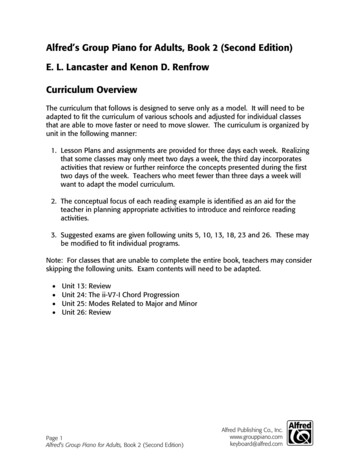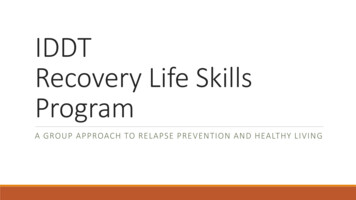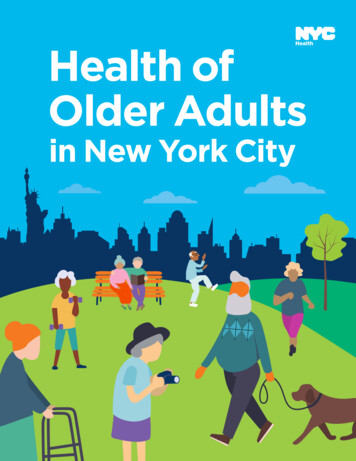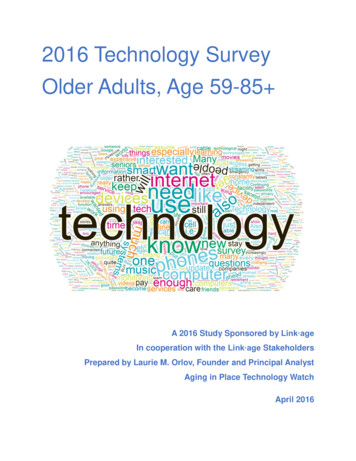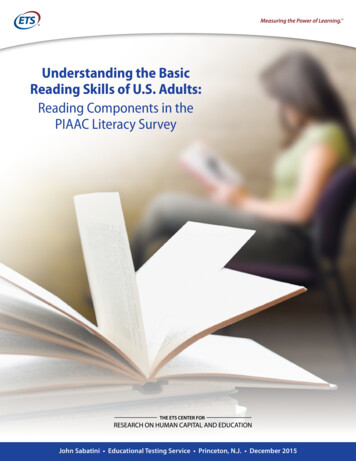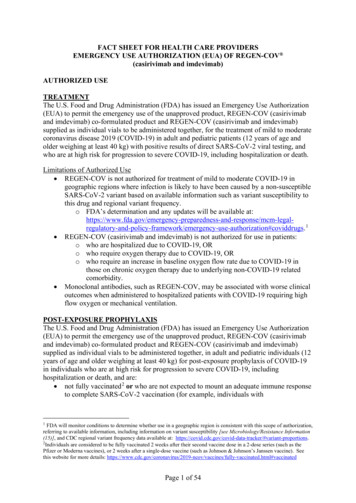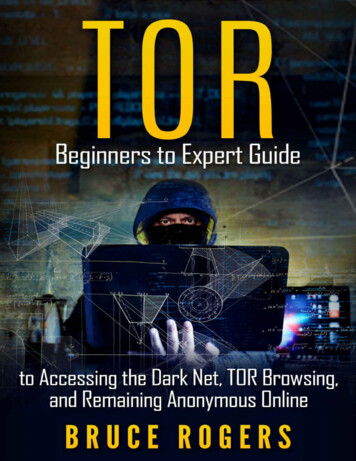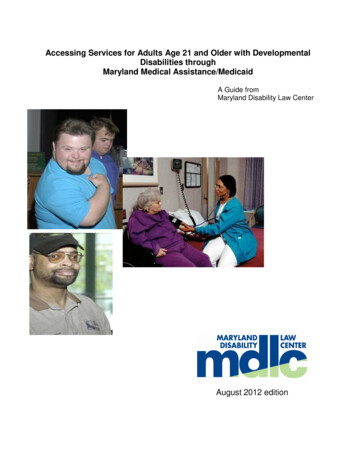
Transcription
Accessing Services for Adults Age 21 and Older with DevelopmentalDisabilities throughMaryland Medical Assistance/MedicaidA Guide fromMaryland Disability Law CenterAugust 2012 edition
2
Accessing Services for Adults Age 21 and Older with DevelopmentalDisabilities throughMaryland Medical Assistance/MedicaidTable of ContentsWhat is Maryland Disability Law Center?.4What is Maryland Medicaid/ Medical Assistance?.4What healthcare services should Medicaid cover for adults?.4What is HealthChoice?.5What are carved-out services?.5What is the fee-for-service Medicaid program?.6Can adults be charged for the healthcare services they receive under Medicaid?.6What dental services are available for adults on Medicaid? 6Can adults get coverage for eye glasses and eye exams?.6What are durable medical equipment and disposable medical supplies?.6How can I get medical equipment and supplies for an adult?.6How can I get communication devices?.7How can I gain access to mental health services?.7What is personal care?.8What is Community First Choice Medicaid State Plan Option?.9What is home health care?.9How can adults access transportation to medical appointments? .9What is the Rare and Expensive Case Management (REM) program? .9What residential services are adults eligible for under Medicaid?.10What eligibility determination process is used by Developmental Disabilities Administration (DDA)?.10What is the relationship between Medicaid services and services from Developmental DisabilitiesAdministration (DDA)?.10What is the Community Pathways waiver? 11How do adults apply for the Community Pathways waiver?What services are available under the waiver?What if an individual in the waiver needs additional services?Can services be denied under the waiver?What is the New Directions waiver? 12How do adults apply for the New Directions waiver?What is the Living at Home waiver?.13How do adults apply for the Living at Home waiver?What is the Older Adults waiver?.13How do adults apply for the Older Adults waiver?What are some of the legal rights of all Medicaid recipients? .13What does “medically necessary” mean?.14What if an individual’s treating professional recommends a service or benefit asmedically necessary, but an MCO or DHMH denies the benefit?What if the needed service is not available close to a Medicaid recipient’s home? .14What if an individual has private insurance in addition to Medicaid? .14What are the next steps if an individual cannot obtain needed Medicaid services? .143
This booklet provides information about the right to healthcare services for adults with developmentaldisabilities age 21 or older on Maryland Medical Assistance. Medical Assistance is also called Medicaid.For children and young adults under the age of 21, please refer to MDLC’s Children’s Medicaid Booklet,“Accessing Services for Children with Developmental Disabilities through Maryland MedicalAssistance/Medicaid and MCHP.”What is Maryland Disability Law Center?Maryland Disability Law Center (MDLC), the designated protection and advocacy agency for the State ofMaryland, protects and advocates for the civil rights of people with disabilities. Our goal is to create amore integrated and just society by advancing the legal rights of people with disabilities and ensuringequal opportunities to participate in community life. We are a non-profit law firm. We provide informationand referral, legal representation, abuse and neglect investigations, technical assistance, and communityoutreach and training.What is Maryland Medicaid /Medical Assistance?Medicaid, also called the Maryland Medical Assistance Program, is a joint state and federal healthinsurance program that offers access to a broad array of healthcare services to low-income and otherqualifying individuals. It is under the control of the Maryland Department of Health and Mental Hygiene(DHMH), but to apply for Medical Assistance contact your local Department of Social Services. For moreinformation, visit the Maryland Department of Human Resources’ l.php or the Maryland Department of Health and MentalHygiene’s website: spx.What healthcare services should Medicaid cover for adults?Any service should be covered if it is recommended as medically necessary by the person’s doctor oranother licensed health care practitioner, and included in Maryland’s Medicaid State Plan.Additional services, discussed on pages 11-13 of this booklet, will be covered if the individual is enrolledin a Medicaid waiver program such as Community Pathways or New Directions. Call MDLC if you want toreceive a separate publication about the Developmental Disability Administration Medicaid waiverprograms.Services covered for adults include:Doctor visits, including visits to specialistsFamily planningHome healthHospice careHospital services, including psychiatric, emergency room and outpatientLaboratory and x-rayMedical equipment and suppliesMedicare premiumsMental healthNursing facilitiesPersonal carePhysical therapyPrescription drugsPrimary careSubstance abuse treatmentTransportation to Medicaid-covered servicesEye exams4
Adults enrolled in a Managed Care Organization (MCO) may also have access to limited dentalcare depending on the MCO they choose. Adults in the Rare and Expensive Case Management(REM) program receive full coverage for dental care. See page 9.Change in service coverage is likely so check back with MDLC for updates.Services that are NOT covered for adults:Full-time in-home shift nurses or shift home health aidesMost dental careCommunity residential (for example, a group home)Environmental modificationsHabilitation (learning new skills)In-home support servicesIn-home behavioral aidesRespite careVocational trainingOccupational therapy unless in a hospital or through home healthSpeech therapy unless in a hospital or through home healthHowever, some of these services are covered for adults with developmental disabilities in aMedicaid waiver program. See pages 11-13. Some of these services, such as shift nurses andhome health aides and full dental care, are covered for adults in REM. See page 9.What is HealthChoice?HealthChoice is the name of Maryland’s statewide mandatory managed care program. The HealthChoiceProgram provides health care to most Medicaid recipients. Eligible Medicaid recipients choose and enrollin a Managed Care Organization (MCO) or health plan. They select a Primary Care Provider (PCP) whois a doctor to oversee their medical care. When participating in HealthChoice, the Medicaid recipientmust select a PCP who is a member of the MCO’s provider network. The PCP is a key party, and isresponsible for making referrals to specialists and other services, such as durable medical equipmentassessments. Some referrals require the PCP to obtain prior approval from the MCO. People inHealthChoice are also entitled to receive other carved-out healthcare services under Medicaid that arediscussed next.What are carved-out services?For individuals in HealthChoice, some services are covered by Medicaid, but are not covered by theMCO. Individuals do not need MCO approval or MCO doctor referrals to access these services. This canbe confusing because the individual must apply to other agencies for access to these “carved-outservices” and the MCO may not be helpful in guiding you to these agencies. These services are:Mental health servicesPersonal careCommunication devicesInitial substance abuse assessment (also covered by the MCO)Nursing home and any long-term care facility stay longer than 30 daysLimited residential care for persons with developmental disabilities5
What is the fee-for-service Medicaid program?Some people are not enrolled in a MCO but are enrolled in the fee-for-service system. The Medicaidrecipient can go to any doctor or other provider who accepts Medicaid. However DHMH still mustapprove or authorize some services in advance. For example, people in the REM program and peoplewho are eligible for both Medicare and Medicaid do not join an MCO and are in the fee-for-servicesystem.Can adults be charged for the healthcare services they receive under Medicaid?Most services and benefits will be free but recipients may be asked to pay a very small part of the costfor some services, called a co-payment. For example, an MCO may charge a 1 or 3 co-payment forprescription drugs. Other than a small co-payment, providers should not bill you for the services youreceive when you are on Medicaid even if DHMH or the MCO has denied coverage and payment for yourservices. If you receive a bill, you should call MDLC.What dental services are available for adults on Medicaid?Some MCOs provide limited coverage for some preventive dental care. These services could bediscontinued at any time because they are optional and not required by law. Call your MCO customerservice number for more information or see the pamphlet ents/120306 HC cc Mar012012 v1-PREP.pdfFee-for-service Medicaid does not cover dental care for adults except for pregnant women and adults inthe REM Program, who have access to full dental care. Contact DentaQuest for information andparticipating dentists at 1.888.696.9598 or www.dentaquestgov.com.Can adults get coverage for eye glasses and eye exams?MCOs provide limited coverage for eyeglasses and/or eye exams every one or two years. Other than eyeexams every two years, these services could be discontinued at any time because they are optional andnot required by law. Call your MCO customer service number for more information or see the pamphletat ts/120306 HC cc Mar012012 v1-PREP.pdfFee-for-service Medicaid including the REM Program covers eye exams but not eyeglasses.What are durable medical equipment and disposable medical supplies?Individuals on Medicaid are eligible for all medically necessary durable medical equipment (DME) anddisposable medical supplies. Some examples include:Durable medical equipment:Disposable medical supplies:wheelchairsadult diapersseating and positioning devicesdiabetic suppliestransfer equipmententeral/ parenteral nutritional formulaspecialized beds.formula for PKU/ other feeding disorders.How can I get medical equipment and supplies for an adult?To get equipment and supplies, you should get a referral from the individual’s doctor. In some cases, aspecialized assessment may be needed to determine the appropriate equipment needs of the individual.A DME vendor, a company that supplies equipment, will need to submit a request for Medicaid approvalwith the necessary paperwork.6
Individuals in HealthChoice need approval from the MCO or health plan. The health plan should let youand the vendor know within 72 hours if the equipment or supplies are approved or denied. If approved,the individual should receive the equipment or supplies within 7 days. If there is an emergency need, theindividual should receive the equipment or supplies within 24 hours.Individuals in a fee-for-service program need DHMH approval for the equipment, and these timetablesare not applicable. However, individuals in fee-for-service programs are still entitled to have equipmentand supplies approved or denied without unreasonable delay. If the services or equipment is approved,the individuals have the right to have it delivered without unreasonable delay.How can I get communication devices?Under the DME benefit, adults can receive assessments for augmentative communication devices andthe devices themselves where recommended following an assessment. Ask the primary care doctor fora referral to a speech and language pathologist able to perform such assessments. If the speech andlanguage pathologist recommends a communication device, whether the individual is in an MCO or feefor-service Medicaid, DHMH must review the request and approve it first. The speech and languagepathologist who does the assessment will work with DHMH, and possibly the vendor of thecommunication device, to submit the proper documentation needed for approval to DHMH. The primarycare physician should review the assessment and submit a letter agreeing that the individual needs thedevice. For more information, Contact MDLC if an individual cannot obtain either the assessment for a communication device or thedevice itself.Maryland Medicaid may not cover non-traditional communication devices. For example, DHMH has notapproved coverage of an iPad even though an individual may use it as a communication device. ContactMDLC about possible Developmental Disabilities Administration (DDA) funding of non-traditionalcommunication devices.How can I gain access to mental health services?Individuals diagnosed with a mental illness can access mental health services. Other than the first 12outpatient therapy visits or emergency room care, services must generally be pre-approved by a privateagency working for the state called ValueOptions and will require a professional’s referral. Mental healthservices include, but are not limited to:Diagnostic evaluation and assessmentMedication managementIndividual therapyGroup therapyFamily therapyOutpatient servicesMental health targeted case managementInpatient hospitalizationPartial hospitalization/ day treatmentMobile treatmentPsychiatric rehabilitation programIf the individual does not have a mental illness diagnosis covered by the public mental health system,they will not be eligible for specialty mental health services. The MCO is still responsible for providingprimary mental health care.7
Individuals, families and professionals may also contact ValueOptions 24 hours a day for individuals witha developmental disability who do not have a mental illness diagnosis if they need a psychiatricassessment, medication monitoring, or other related services.Professionals: Contact ValueOptions with the specific services requested. It is also recommended thatthe referral be confirmed in writing, be signed by a licensed professional, document all the specifics ofthe service request, and document the medical necessity of the service. If possible, the referringprofessional should use the ProviderConnect providerLogin.do.The professional can also call 1-800-888-1965 or contact ValueOptions by fax (1-877-502-1044) (keep acopy of your fax confirmation) or mail:Jaime Miller, LCSW-CDirector of Clinical OperationsValueOptions MarylandP.O. Box 166Linthicum, MD 21090410-691-4091Professionals can review Maryland's public mental health system provider manual for further details. It isavailable upon request from the Mental Hygiene Administration, ValueOptions, or on-line athttp://maryland.valueoptions.com/provider/prv man.htm.Individuals and Families: Although an individual or family member may call ValueOptions to requestmental health services at 1-800-888-1965, we recommend that you obtain the assistance of a mentalhealth professional to make the referral for services. Be sure to provide the professional with this bookletfor assistance in the referral process.ValueOptions should comply with strict timelines found in state regulations for approving services andarranging for a provider to deliver the services.What is personal care?Under the Medical Assistance Personal Care (MAPC) program, a personal care aide provides hands ondirect support and assistance to a recipient with activities of daily living such as eating, toileting, bathing,dressing, reminding, and mobility if it is medically necessary. MAPC can be provided both inside andoutside the individual’s home including at work or in job skills programs. No waiting list can bemaintained for this service. Personal care, in contrast to private duty nursing or home health care, is forindividuals who do not require skilled care.Anyone, including a family member, case manager, or other person can make a referral for this serviceby contacting the county personal care program within each county health department. If you contact thehealth department but have trouble getting an assessment or approval for personal care services, orgetting an aide to provide sufficient hours, contact MDLC.Even after approval for services, local health departments may have trouble finding someone to providepersonal care services at the current payment rate, which is a low flat rate per day. If there is a friend,neighbor or relative willing to provide personal care, that person can apply to become an approvedpersonal care provider. Approved providers cannot be the spouse or an individual who has full andunrestricted powers of guardianship of the person requiring personal care.If the individual is in a Medicaid waiver program and is receiving or wants to receive personal care, therules may make it difficult to get enough hours to meet the individual’s needs. Call MDLC if you have thisproblem.8
What is Community First Choice Medicaid state plan option?Community First Choice Medicaid state plan option will be available in 2013 to provide long term servicesand supports through personal and attendant care services with a better payment rate and more hours ofservice than under Maryland’s current personal care program. To qualify, an adult need not be in anursing home but must meet the medical eligibility criteria for “nursing facility level of care”. DHMHupdates about this planned program are Pages/Long%20Term%20Care%20Reform.aspx.What is home health care?Home health care agencies can provide skilled nursing services and/or home health aides to provideskilled care and assist with activities of daily living. Home health services are typically provided in theMedicaid recipient’s home. Some individuals can get physical, occupational and speech therapy athome, mental health services at home, and medical supplies to be used at home. Home health servicesare available on a part-time, intermittent basis to individuals who have a medical need for them, andcannot be accessed just because it is more convenient than bringing the individual to a provider.However, there is no requirement that the individual be housebound to receive home health services.In order to receive home health services you should get a referral from your doctor, and the doctor willneed to get approval from the MCO. If you are in fee-for-service Medical Assistance, your doctor willneed to get approval from DHMH. Your doctor should work in conjunction with a home health provider toobtain the services.Shift or full-time nursing and home health aide services are available under the REM Program for eligibleindividuals but are not covered by the regular state Medicaid program for adults. Adults in some Medicaidwaiver programs also have access to shift/full-time home health aides and nurses.How can adults access transportation to medical appointments?When a recipient does not have transportation to get to a healthcare provider, transportation assistanceis a covered service. Contact the county health department and ask for the Medical Assistancetransportation program. Find the health department’s phone number in the blue government section ofyour phone book. Some healthcare providers have their own transportation systems for patients. Also,your MCO may provide bus tokens, taxi service or van service if it is medically necessary. Contact yourMCO for more information. See e/Documents/120306 HC cc Mar012012 v1-PREP.pdfWhat is the Rare and Expensive Case Management (REM) program?REM is a special part of the Medicaid program for people who have certain medical conditions ordiagnoses and meet other eligibility criteria. For a list of qualifying conditions file 10.09.69.17.htm or contact MDLC.Apply for REM either before or after joining an MCO. Once accepted by REM, the individual is in the feefor-service program and can see any healthcare provider who accepts Medicaid. The individual isassigned a REM case manager who should be contacted for help in obtaining healthcare services. Animportant benefit of REM is that adults over 21, like persons under 21, can continue to receive allmedically necessary in-home nursing services or certified nursing assistant services, while most adultson Medicaid can only get very limited home health nursing or aide services. Other benefits for adultsover 21 include the following additional services that other adult Medicaid recipients do not receive: fulldental services, occupational therapy in the community, speech, hearing and language services in thecommunity, nutritional counseling and supplements, and chiropractic care.9
If an individual in REM becomes eligible for Social Security Disability Insurance (SSDI) and Medicare,they may still remain eligible for REM.What residential services are adults eligible for under Medicaid?The Medicaid program covers institutional placements in hospitals, nursing homes, and IntermediateCare Facilities for the Intellectually Disabled (ICF-ID) for those who meet the eligibility criteria.Institutional care is considered the most restrictive placement for individuals and may only be approved ifthere is no less restrictive setting in which services can be provided within a reasonable time. For adultsin the Community Pathways or New Directions waivers, which are Medicaid waiver programs forindividuals with developmental disabilities (discussed below), residential services in community homesare covered based on individual need. For more information contact the individual’s service or resourcecoordinator or MDLC.If an adult is not already in one of these Medicaid waiver programs, and has a health or safety need forresidential services, contact the service/ resource coordinator or MDLC.Contact MDLC about the legal rights of individuals with developmental disabilities who want to leavenursing homes. Nursing facility residents may be eligible to enter Medicaid waiver programs – evenprograms with waiting lists -- to be placed in a community residential program or to receive othercommunity-based services that will enable a discharge from the nursing facility.MDLC focuses on getting individuals community-based services so they can continue to live at home, orin the community.What eligibility determination process is used by Developmental DisabilitiesAdministration (DDA)?If you believe an individual has a developmental disability, apply to DDA now for an eligibilitydetermination regardless of whether the individual currently needs services from DDA or is eligible forMedicaid. See aspx for a copy of the application.Apply before the individual turns 22 (or as soon as possible afterwards) and provide DDA with allavailable records about the person’s disability prior to age 22 including psychological testing data ifavailable.DDA may determine that a person is (1) ineligible for services, (2) eligible for Individual Support Services(ISS) only -- also called Supports Only (SO), or (3) fully eligible as an individual with a developmentaldisability (DD) -- the category that provides the most services. To be eligible in the future for a dayprogram, a residential program, or placement in one of the two waiver programs discussed below, DDAmust find that the individual has a developmental disability. Individuals found eligible either as ISS/SO orDD are also given a priority category, such as crisis resolution (the highest category), and will likely beplaced on a waiting list for services. Contact MDLC for further information about the specific criteria DDAuses in this process and how to request a change or appeal eligibility or priority decisions by DDA. Youmay also request a copy of our booklet, Maryland’s Developmental Disabilities Administration MedicaidWaivers: A Practical Guide.What is the relationship between Medicaid services and services from DevelopmentalDisabilities Administration (DDA)?DDA provides additional services not covered by the regular Medicaid program. These DDA servicesprimarily consist of staff support to help people live more independently. The services include supportedemployment, respite care, staff support in the home, environmental modifications, behavior supports,assistive technology and day and residential services. Because funding for new applicants is limited,DDA assigns each applicant an eligibility and priority category. DDA can usually provide new services10
only to people found eligible in its crisis resolution priority category – people who are in crisis. Oneimportant exception is that for many years, DDA has had funding to serve eligible young adults as theytransition from school after they turn 21 years old. Youth with developmental disabilities who leave orcomplete school before age 21 will not be included in DDA’s definition of transition aged youth until their21st birthday. Families should re-contact DDA at that time.DDA provides most of its services through a Community Pathways Medicaid waiver program thataccepts a limited number of new participants each year. DDA can enroll individuals in its Medicaidwaivers even if they are not eligible for community Medical Assistance. The eligibility criteria forMedicaid waivers allow the monthly income of individuals over 18 years old to be 300% of the maximummonthly Supplemental Security Income (SSI) benefit. All people enrolled in DDA Medicaid waivers areentitled to receive Medical Assistance for health care as well as the DDA Medicaid waiver services theyneed.MDLC advises transition aged youth and their families to work with a DDA service or resourcecoordinator and accept DDA services at age 21 or 22 when leaving school. If services are declined ordelayed when transitioning from school, DDA will place the young adult on its waiting list and theindividual may need to be in crisis to receive DDA services and enter a Medicaid waiver program in thefuture.Because priority categories can change when family or individual circumstances change, for adults not ina DDA Medicaid waiver program, be sure to notify DDA or the resource coordinator immediately if youbelieve the individual should be in a higher priority category.If you believe DDA made a wrong decision about eligibility or priority category, you should requestreconsideration or file an appeal.DDA has some limited funding for Low Intensity Support Services (LISS) to address a wide range ofindividual needs for up to 3,000/year on a first come, first served basis. Depending on the availability offunds, DDA can approve additional LISS funding beyond 3,000. If you do not know if a needed serviceis funded by DDA through Medicaid or by state only funds or whether an individual is in the waiver,contact MDLC for assistance.What is the Community Pathways waiver?The Community Pathways waiver is administered by DDA. Community Pathways provides services andsupports in the community for individuals with developmental disabilities. There are a limited number ofopen slots available in this waiver each year and applicants can be placed on a waiting list if the waiver isfull. Waiver participants qualify for Medicaid services, and also receive additional services specific to thewaiver. In order to qualify for the Community Pathways waiver, individuals must meet the level of carerequirements necessary for admission to an Intermediate Care Facility (ICF-ID). This means the personmust meet the criteria for developmental disability in Health General section 7-101 of the Maryland Codeand also meet financial eligibility requirements. If you don’t know whether an individual is in the waiver,but they get some support from DDA, a
participating dentists at 1.888.696.9598 or www.dentaquestgov.com. Can adults get coverage for eye glasses and eye exams? MCOs provide limited coverage for eyeglasses and/or eye exams every one or two years. Other than eye exams every two years, these services could be discontinued at an
